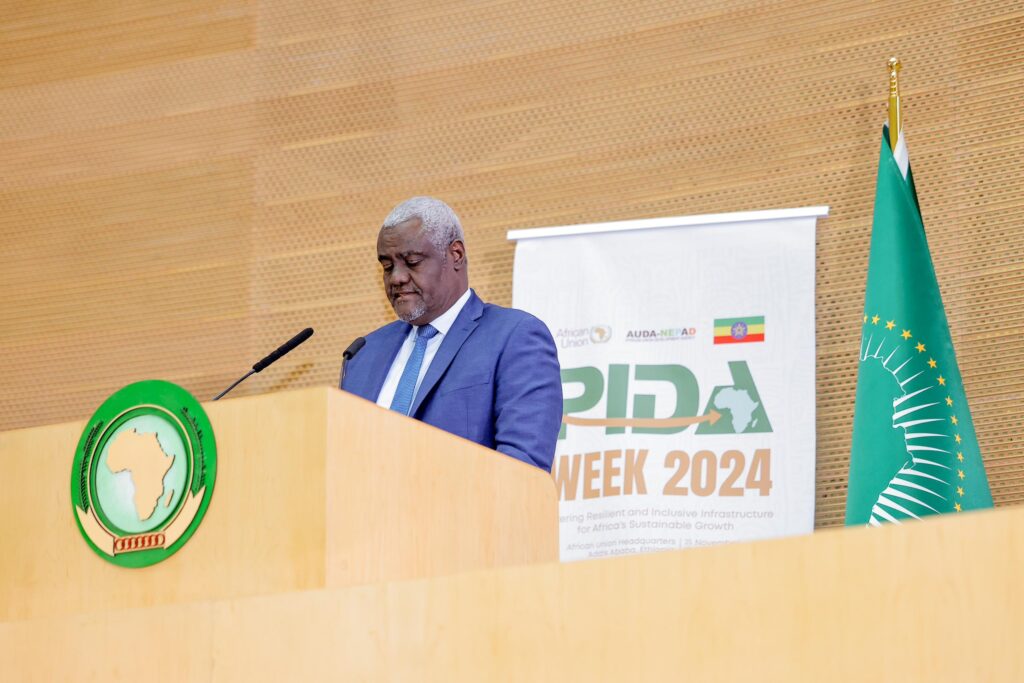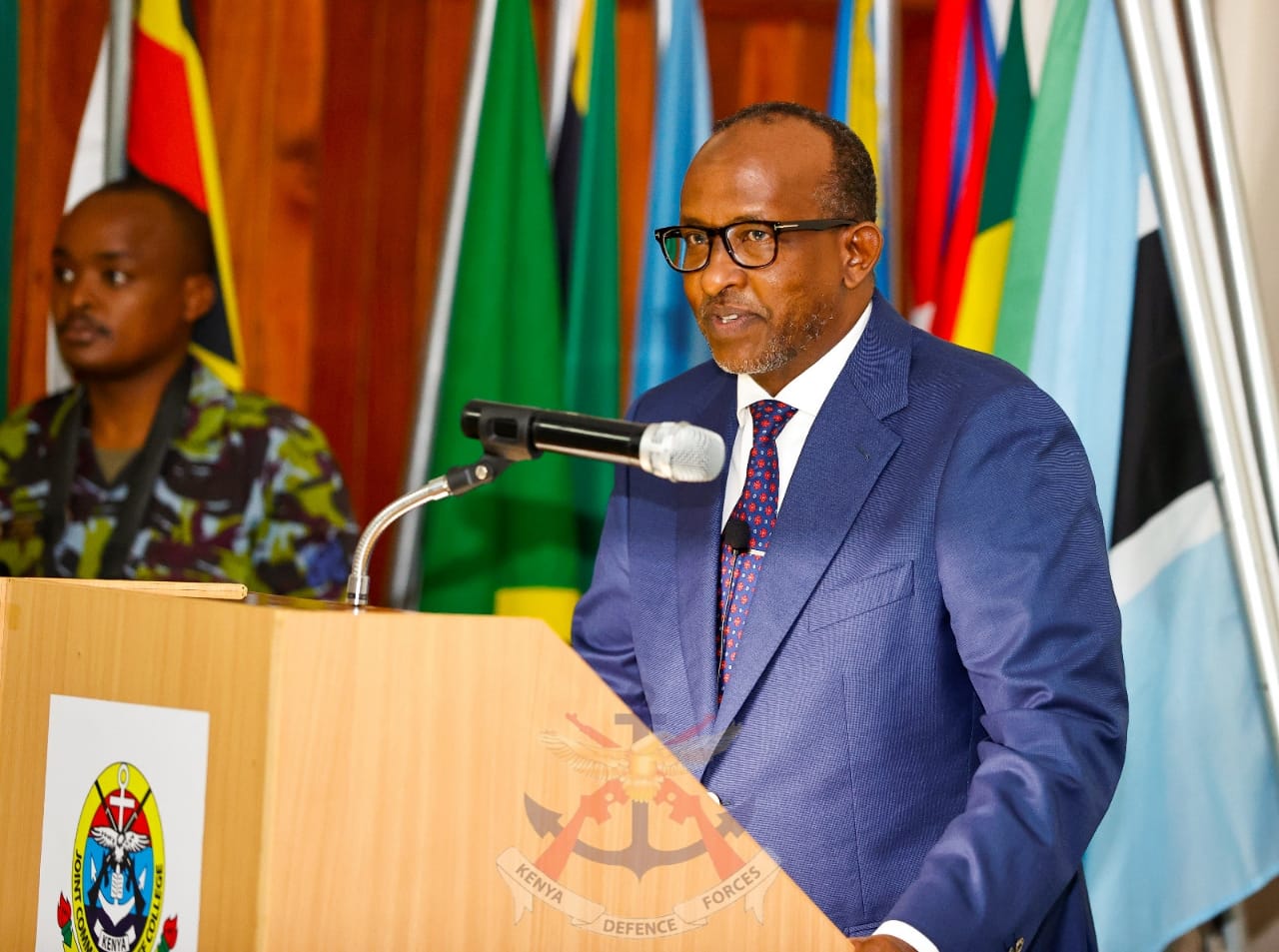AU Chairperson Highlights Resilient Infrastructure as Catalyst for Africa’s Sustainable Growth


By Baboloki Semele
Addis Ababa, Ethiopia, 26 November 2024 – Chairperson of the African Union Commission, Dr. Moussa Faki Mahamat, called for urgent investments in resilient and inclusive infrastructure to drive Africa’s sustainable growth. Speaking at the opening of the 8th Programme for Infrastructure Development in Africa (PIDA) Week at the African Union headquarters, in Addis Ababa, Ethiopia, Dr. Mahamat emphasized Africa’s critical juncture in its development journey, highlighting the need for structural transformation as envisioned in Agenda 2063. “The theme of PIDA Week 2024, Promoting resilient and inclusive infrastructure for sustainable growth in Africa, reflects our continent’s commitment to building a prosperous and integrated future for all,” he said.
Dr. Mahamat lauded Ethiopia for its dedication to African unity and development, noting the significance of hosting the event in Addis Ababa, a city synonymous with African resilience and cooperation.
Agenda 2063: A Blueprint for Transformation
Reaffirming the aspirations outlined in Agenda 2063, Dr. Mahamat stressed the importance of modern, resilient, and inclusive infrastructure in achieving economic transformation and continental integration. He pointed to the success of the first Ten-Year Implementation Plan, which builds on lessons from the NEPAD program and identifies priority infrastructure projects designed to promote sustainable growth.
Despite progress, challenges such as unemployment and gender inequality persist. “Every year, Africa loses around $37 billion due to inactive youth, with women disproportionately affected,” he noted. “Reducing female unemployment by just 1% could generate nearly $20 billion annually.”
Innovative Financing and Partnerships
Dr. Mahamat underscored the need to reclassify infrastructure as an asset class capable of attracting diversified financing. He urged stakeholders to mobilize funds from African pension schemes, commercial banks, and multilateral development institutions while ensuring investments are climate-resilient and inclusive.
He also emphasized the role of small and medium-sized enterprises (SMEs) in driving economic diversification. “By supporting SMEs and leveraging technologies, we can integrate them into regional and global value chains, fostering innovation and resilience,” he added.
Infrastructure as a Pillar of Regional Integration
Highlighting the African Continental Free Trade Area (AfCFTA) as a transformative tool for regional integration, Dr. Mahamat pointed to its operational framework—including digital payment systems and rules of origin—as enablers of inter-African trade. With Africa’s population projected to reach 2.5 billion by 2050, the AfCFTA offers a unique opportunity to spur sustainable development across the continent.
PIDA: A Platform for Prosperity
Dr. Mahamat described PIDA as Africa’s flagship initiative for cross-border infrastructure development, with a focus on resilience, inclusiveness, and sustainability. By addressing interconnected challenges such as peace, security, and development through megaprojects, PIDA strengthens Africa’s capacity for self-driven growth.
“Through innovative financing, progressive partnerships, and transformative projects, Africa can lay the foundations for an economically integrated, socially inclusive, and ecologically resilient continent,” Dr. Mahamat concluded.The Programme for Infrastructure Development in Africa (PIDA), a Multi sector programme covering four Transport, Energy, Transboundary water and Telecommunication/ICT is dedicated to facilitating continental integration in Africa through improved regional infrastructure and is designed to support implementation of the African Union Abuja Treaty and the creation of the African economic Community,
PIDA is a joint initiative of the African Union Commission (AUC), the African Union Development Agency for New Partnership for Africa’s Development Planning and Coordination Agency (AUDA-NEPAD), and the African Development Bank (AfDB). PIDA is grounded in regional and continental master plans and action plans as well as other relevant work undertaken by the African Union (AU), the regional economic Communities (RECs), the regional and continental technical agencies (including the lake and river basin organizations (L/RBO) and power pools (PP)), and the concerned countries.
At the XVIIIth Ordinary Session of the African Union (AU) held in Addis Ababa, Ethiopia, on 29-30 January 2012, the AU Heads of State and Government formally endorsed the Programme for Infrastructure Development in Africa (PIDA) through adoption of the “Declaration on the Programme for Infrastructure Development in Africa” (Doc. EX.CL/702(XX)).
Objectives
The importance of regional integration for supporting Africa’s economic development has long been recognized by African leaders, who have consistently expressed their desire to build a common market for goods and services. PIDA provides a common framework for African stakeholders to build the infrastructure necessary for more integrated transport, energy, ICT and trans-boundary water networks to boost trade, spark growth and create jobs. Implementing it will transform the way business is done and help deliver a well-connected and prosperous Africa.
PIDA’s overall strategic objective aims at accelerating the regional integration of the continent and facilitating the creation of African Regional Economic as planned by the Abuja Treaty. By improving access to integrated regional and continental infrastructure networks, PIDA will allow countries the primary beneficiaries to meet forecast demand for infrastructure services and boost their competitiveness by:
Increasing efficiencies
Accelerating growth
Facilitating integration in the world economy
Improving living standards
Unleashing intra-African trade.






